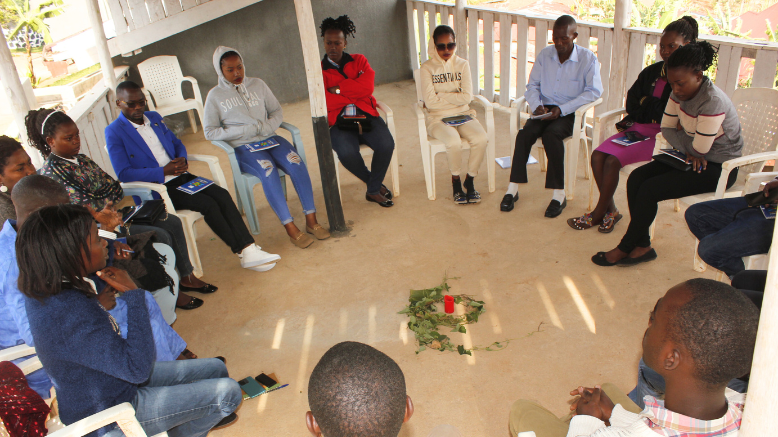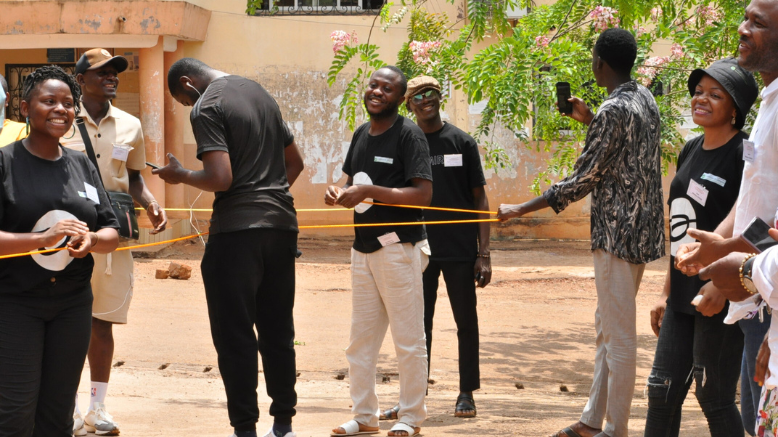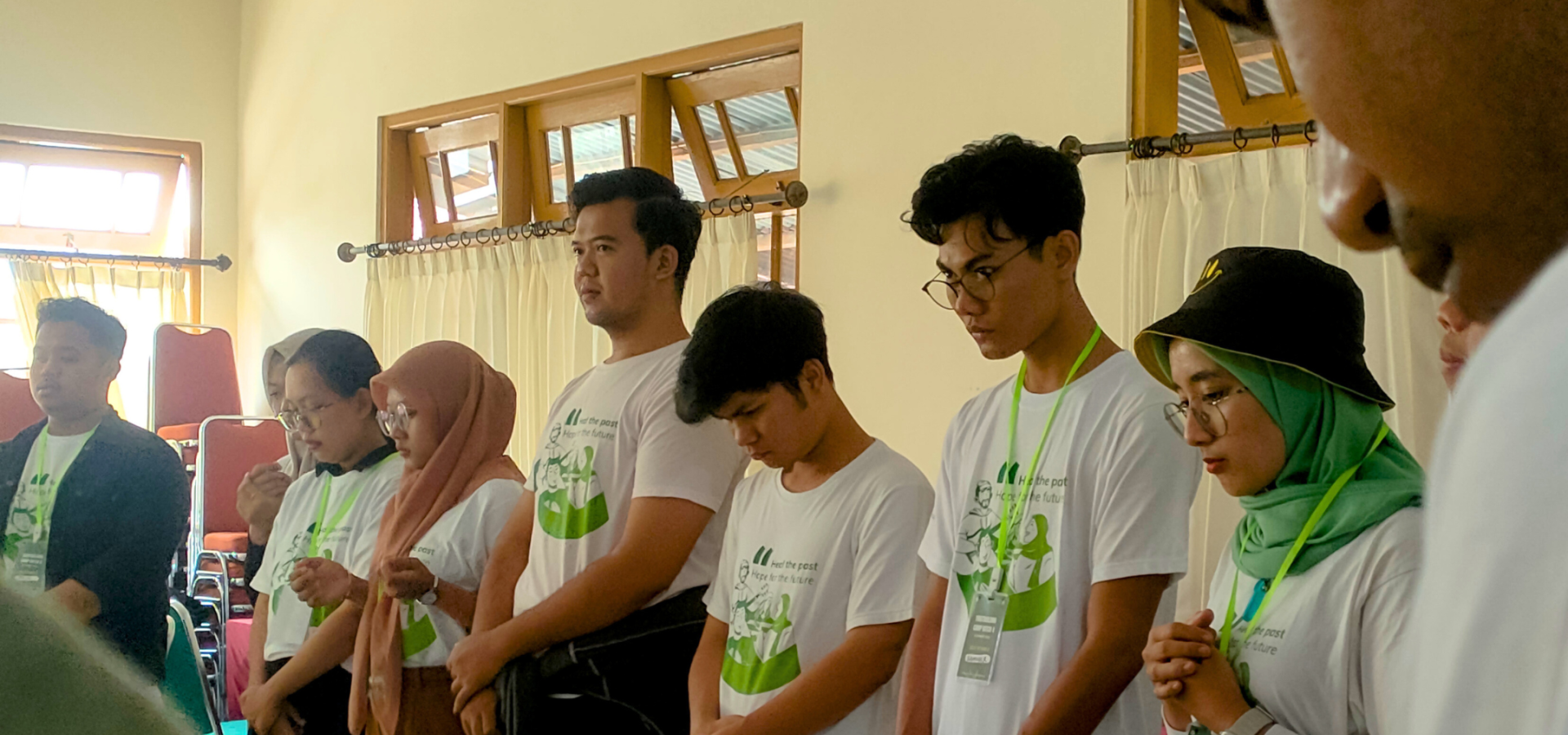Trustbuilding as the Foundation for Sustainable Peace
Trustbuilding as the Foundation for Sustainable Peace: IofC’s Response to "What is Peace?"
by Manon Michelle Monhemius and Talia Smith
The 11th edition of Geneva Peace Week boldly posed a fundamental question: "What is Peace?"
When we ask the question, "What is peace?", we often think of the absence of war or conflict. Yet, peace is much more than the cessation of violence. It is a process that addresses the underlying causes of conflict, builds bridges between divided communities, and develops environments where justice, equity, and human dignity are upheld. At the heart of this process is trust, an essential and often overlooked foundation for any lasting peace.
The Trustbuilding Program (TBP) presented at Geneva Peace Week with a workshop called “Building trust across divides - strategies, tools, and success stories", co-organised by the Institute for Community-Based Sociotherapy (ICBS). It showcased examples of grassroots peacebuilding in Ukraine and Rwanda and gave space for an interesting exchange with the participating peacebuilders from different sectors and institutions.
By focusing on trust as a central pillar of peace, the TBP empowers individuals and communities to confront issues of division, conflict, and mistrust— ultimately, with the aim of reconciliation and healing. But how exactly does trustbuilding define and contribute to peace? Let’s explore the ways in which this vital work responds to the profound question: "What is peace?"

1. Peace Begins with Human Connection: Trust as a Cornerstone
At its core, peace is relational. It is built on the quality of human relationships, whether within families, communities, or nations. Trust is the glue that holds these relationships together. Where there is mistrust, fear, or hatred, peace cannot flourish.
The TBP operates on the belief that peace begins with trust. In conflict zones, divided societies, or communities plagued by historical injustices, like in Ukraine, building trust between individuals and groups is the first step toward healing. Without trust, initiatives for reconciliation or peace agreements remain hollow, as deep-rooted suspicions and grievances usually resurface.
Through dialogue, personal reflection, and community-driven initiatives, the TBP creates spaces where individuals from different backgrounds can meet, share their stories, and begin the slow but vital process of trustbuilding. Whether in countries recovering from civil war, or in communities fractured by racial or religious tensions, these conversations lay the groundwork for peace by reconnecting people at the human level.

2. Addressing Historical Wounds: Peace Requires Justice and Accountability
One of the major barriers to peace is the unaddressed wounds of the past. In communities where trust has been broken—whether through colonialism, systemic racism, or violent conflict—peace cannot take root unless these historical wounds are acknowledged and addressed. Trustbuilding requires confronting these injustices head-on and creating pathways toward accountability and healing.
IofC’s approach to trustbuilding is not about avoiding difficult conversations. Instead, it embraces the necessity of truth-telling and reconciliation. In countries like South Africa and Burundi, the TBP has facilitated dialogues where both victims and perpetrators of violence come together to share their stories, often for the first time. By encouraging individuals to listen deeply to one another, the TBP helps communities grapple with the pain of the past in a way that promotes understanding rather than division.
'I came out of the workshop with the understanding that I must overcome the feeling of being a victim. I will have to learn more about the aggressor's point of view because they also suffered. I realised that I must forgive and take the first step to meet the aggressor, which I did. At my university, I met a boy whose father harmed my family. It took some effort, but when he paused to talk to me, I told him that I had forgiven his parents for what they did to my family. I told him that I would like to renew our relationship. He agreed, and now we are good friends, thanks to the trustbuilding project. ~ Participant of the TBP in Burundi
This process of truth and reconciliation allows for the rebuilding of trust on a new foundation—one that is honest about past wrongs but committed to moving forward together. Without this step, peace is fragile and can easily be undermined by unresolved grievances.

3. Sustained Engagement: Building Trust Takes Time
One of the critical lessons IofC has learned from decades of trustbuilding work is that trust cannot be built overnight. It requires sustained effort, patience, and a willingness to continue the work even when progress seems slow. This long-term commitment is essential for achieving lasting peace.
The TBP is designed for deep and ongoing engagement with communities. Rather than offering quick fixes, it invests in building trust through sustained relationships and local ownership of peace processes. In places like Australia and Kenya, where IofC has worked for many years, the impact of trustbuilding is seen in the way people in local communities have taken the lead in truth-telling and sharing initiatives and promoting social cohesion.
'The Muslim youth that live around my church has recently been helping to take care of the church. I have been holding lunches for them. The trustbuilding project gave me the confidence and skills to interact with people from different walks of life for the good of my community.' ~ Christian clergy from Mombasa, TBP Kenya
This long-term approach also acknowledges that peace is not a destination but a journey. Trust must be continuously nurtured, especially in societies where historical wounds and divisions run deep. IofC's presence over time helps communities remain committed to the ongoing process of trustbuilding, even in the face of setbacks or challenges.

4. Empowering Local Solutions: Trust Enables Community-Led Peacebuilding
True peace cannot be imposed from the outside. It must come from within, driven by those who understand the unique challenges and strengths of their own communities. A key aspect of the TBP’s work is its focus on empowering local actors to lead trustbuilding initiatives. Trust allows communities to take ownership of their peace process, building resilience and local solutions to conflict. For example, in Cameroon Trustbuilding Ambassadors that have been trained are now running their own trustbuilding forums in their university that bring together Anglophones and Francophones.
The TBP works by training local leaders, equipping them with the tools and skills to facilitate dialogue and promote trust within their communities. This grassroots, bottom-up approach ensures that trustbuilding efforts are rooted in local realities and are more likely to endure over the long term. When people trust each other, they are more likely to collaborate, share resources, and resolve disputes without resorting to violence.

5. Transforming Hearts and Minds: Peace as an Inner Change
While peace is often framed in terms of external conditions—such as the presence of security or political stability—it is also profoundly personal. Inner peace is a necessary component of building outward peace. IofC’s trustbuilding work focuses on both the internal and external dimensions of peace, recognising that personal transformation is crucial for societal change.
At the heart of IofC’s approach is the idea that peace starts with individuals. Personal reflection, honest self-examination, and a commitment to values and ethical leadership are central to the trustbuilding process. When individuals take responsibility for their actions and work to build trust within themselves, like during the Trustbuilding Camps by TBP Indonesia, they become agents of peace within their communities.
IofC provides tools for this personal transformation through reflective practices, workshops, and storytelling initiatives that encourage participants to explore their own role in promoting peace. By changing the way people think about and approach conflict, IofC helps create a ripple effect of trustbuilding that begins with the individual and extends to the broader society.
Conclusion: Trust as the Foundation of Peace
In responding to the question, "What is peace?" The TBP’s work offers a profound and practical response: peace is the outcome of trust. It is the process of rebuilding relationships, addressing past injustices, and empowering individuals and communities to take responsibility for their shared future.
Through its TBP, IofC demonstrates that sustainable peace is not just the absence of conflict, but the presence of trust. This trust enables dialogue, supports healing, and creates the conditions for justice and reconciliation. In a world where divisions and conflicts continue to challenge the peacebuilding process, IofC’s work provides a blueprint for how trust can transform societies and respond to the call for a deeper, more enduring peace.
By building trust, we are building peace—one relationship, one community, and one nation at a time.
